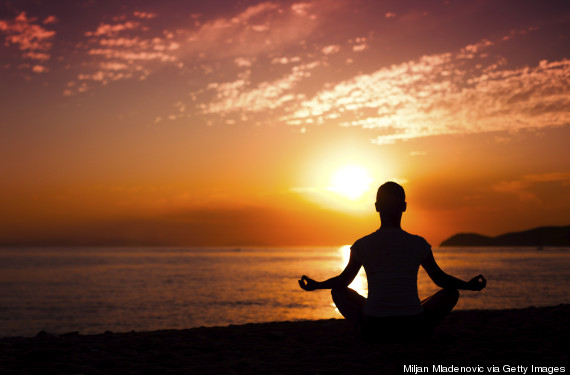
Being stressed out is about as enjoyable as working overtime on a Friday or being stuck in traffic. (For some of us, that is what stresses us out in the first place.)
While we know that a little stress can be useful, the fact still remains that no one likes feeling tense -- but how do we handle it without exacerbating the problem? According to Dr. John C. Reed, M.D., the director of inpatient integrative medicine services at the University of Maryland School of Medicine, there are a few simple relaxation methods we're are already physically wired to do.
"There are basic, self-regulation skills that everybody has, they just don't use them," Reed tells The Huffington Post. "Basically, it's all about figuring out ways to feel good in your body."
Whether you're experiencing a minimal amount of perpetual stress or heightened levels of anxiety, you already have the power to find a place of calm. Below are four ways Reed says we can self-regulate our stress levels, whether we already do them consciously or still need a little practice.
Paying attention to your breath.
Reed says many of us don't optimize our breathing in the way that we should -- especially when we're overwhelmed -- despite it being one of the simplest things we can do. When we're anxious, we naturally try to breathe more, as part of our fight-or-flight response to stress. If you're feeling any baseline levels of tension, try calming yourself down by regulating your breathing. To do this, Reed suggests placing your hand over your belly button and focusing on how your stomach rises and falls.
"[This method] helps you to not be tense in your chest and to not breathe shallow and fast," he explains. "For a lot of people that shallow breathing sort of becomes automatic. They forget that they're stuck in this chronic, physical stress cycle."
Connecting with someone you love.
This self-regulation method is as simple as getting a reassuring pat from a friend or a warm hug from a loving partner. The point, Reed explains, is creating a social bond to help you manage your emotions.
"All of those things stimulate the chemical oxytocin, which helps your immune system work better, calms down your adrenaline and releases the stress ... in your brain," he says. "This shifts your sensation around the body to one of comfort and pleasure as opposed to being tense and inhibited." Can't be near someone you love right away? Reed says even going to a spa and getting a therapeutic massage can have the same effect.
Moving your body.
Think about the last time you felt a wave of stress. How many times in that moment did you just want to move? We want to feel like we're doing something, and Reed says through exercise we're able to shake off those stress-related chemicals in the body.
"If you go to the gym and work out, or even whack a punching bag, you use the body's responses that were built in to deal with the primitive danger responses," he says. By giving in to your natural urge to let off steam -- even if it's just dancing around -- you're helping yourself regulate that anxiety.
Finding your center.
Our biggest and perhaps most "vocal" warning sign when it comes to stress is our physical response to the emotion -- but we don't always listen to our own natural red flags. "We need to really learn to become centered and aware of stress as opposed to just reacting to it," Reed says. "We need to pay attention to what's happening in the body and head."
By listening to what our bodies and minds are telling us (i.e. noticing when we first have thoughts of burnout or start to feel our palms get sweaty), he says, we'll be more inclined to find balance. "The challenge in modern living is that we're constantly exposed to potentially bad things. We're constantly stimulated, and if that's all we do, we exhaust our stress responses," he says. "At some point, you need to build in your life some quiet time and some relaxing time."
